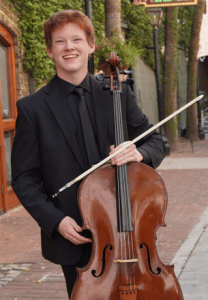Music
Local High School Cellist to Perform Free Solo Recital
High School Cellist, Peter O’Malley (right), will perform a public recital on Thursday, November 10th, at 7:30 pm at St. Johannes Lutheran Church (48 Hasell Street). The program will feature works for unaccompanied cello, including Bach’s Cello Suite No. 5, Fuguing Tune from Coleridge-Taylor Perkinson’s Lamentations, and David Popper’s High School of Cello Playing, Op. 73 No. 20.
The recital is presented free of charge, but donations will be accepted at the door. Donations will be used to assist O’Malley with expenses related to preparing for and taking music conservatory auditions in February 2023.
A native of Charleston, O’Malley began studying cello at the age of seven. He currently studies with Damian Kremer of the Charleston Symphony and attends the Charleston County School of the Arts as a senior, where he sits Principal in both the Symphony Orchestra and Sinfonietta. O’Malley was a founding member of the Phoebus Quartet, which participated in masterclasses with the Parker Quartet, Daniel Ching of the Miró Quartet, and Anthea Kreston, formerly of the Artemis Quartet. He has also played in masterclasses with Xavier Foley, Midori, and Dr. Melissa Kraut. He was the inaugural winner of the Emily Remington Music Scholarship, and has received additional scholarships from the Charleston Symphony Orchestra League and Charleston Music Club, and has played in the 2019-2022 South Carolina All-State Programs. Additionally, O’Malley was named a Piccolo Spoleto “Rising Star” in 2021 and 2022. He attended Luzerne Music Center from 2016 to 2021, Green Mountain Chamber Music Festival in 2020 and 2021, the Castleman Quartet Program in 2022, and Ascent International Chamber Music Festival in 2022.
About the music
Johann Sebastian Bach – Cello Suite No. 5 in C Minor, BWV 1011
Bach’s C Minor cello suite, the fifth of six suites brought to light by the great Catalonian cellist Pablo Casals, stands alone as a dark and brooding masterpiece. This is the only suite with a manuscript in Bach’s autograph (found in its lute transcription), and through its scordatura tuning, the instrument’s resonance changes completely. The Prelude is set as a French Overture, found in none of the other five suites, with a slow introduction and a fast, technical fugue. The Sarabande, often described as “skeletal,” is the only movement which does not feature any rolled chords.
Coleridge-Taylor Perkinson – Lamentations: Black/Folk Song Suite for Solo Cello
i. “Fuguing Tune”
Coleridge-Taylor Perkinson was an American composer whose works took inspiration from Black folk music, spirituals, and the blues. As the title “Fuguing Tune” suggests, the first movement of the suite draws from a traditional Fugue, found in much of classical literature, most notably the works of Johann Sebastian Bach. The movement has a strong, bluesy feel, conveyed by the cello’s rolled chords and rhythms. The four movements of the suite, as Perkinson explained, explore different aspects of African American music, telling a story, “the reflection and statement of a people’s crying out.”
David Popper – High School of Cello Playing, Op. 73 No. 20
David Popper wrote his Hohe Schule des Violoncello-Spiel (High School of Cello Playing) between the years of 1895-1898, as a set of forty etudes aimed for young cellists to build their technical ability. Now acclaimed as a foundational pillar of cello pedagogy, the Popper etudes are studied by cellists tackling challenging, virtuosic repertoire. Etude No. 20 features arpeggios, octaves, rolled chords, and shifts from one end of the fingerboard to the other.

























